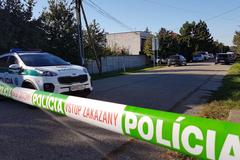The police and the prosecutor’s office have been complaining about the leaks from the investigation of the murders of investigative journalist Ján Kuciak and his fiancée, Martina Kušnírová.
For example, the police operation against people who were later charged in the case had to be carried out earlier than planned, allegedly because the information that they were being monitored leaked to the media. Moreover, several journalists knew the date the operation was planned for. Shortly after the detentions, the media learnt about the testimony of one of the accused, and they later received the alleged testimony of a former member of the Slovak Information Service (SIS) intelligence agency, Peter Tóth.
However, it does not seem that the police or the prosecutor’s office have adopted steps to stop the leaks, the Sme daily reported.
The risks of information leaks

The massive leaks of information before suspects are detained can lead to, for example, the loss of evidence during house searches. Therefore, the respective bodies should be trying to find out who is leaking the information, former Czech investigator Robert Šlachta told Sme.
“It’s important that this does not happen,” he added.
Apart from police officers, a number of people have access to the information in the investigation files. Permission to carry out an operation similar to the one in Kolárovo (Nitra Region) in late September, has to be issued by the prosecutor and the court needs to approve any house search.
Several lawyers and investigators addressed by Sme said that the information regarding the monitoring of the people from Kolárovo could have been given to several prosecutors, judges and their subordinates.
Police Corps President Milan Lučanský, for example, described the lawyers representing the families of the murdered couple as those leaking the details to the media. However, they respond by saying they can get access to only some parts of the file and learn much of their information from the media, Sme reported.
At the same time, they also consider the information leaks to be a problem.
What should be done?
After the police operation in Kolárovo and charges against the four accused were laid, even more people had access to the file. The reason is that the accused can ask for their lawyer to be present at police actions during which evidence against them may be collected.
Czech investigators addressed by Sme confirmed that at this stage there were more leaks to the media.

In the case of the Kuciak and Kušnírová murders, the public learnt, for example, that one of the accused described controversial businessman Marian Kočner as the person who actually ordered the hit. The media later informed that the accused had planned more murders.
The fact that the public has learnt the name of a person who is collaborating with the police can scare others away from testifying to the police, Czech investigator Josef Mareš told Sme.
To prevent the leaks, the police could decide to deny access to the lawyers representing the accused to certain parts of the file. However, this does not happen often, Sme wrote.
According to Šlachta, both the police and the prosecutor’s office should find the person who is leaking the information. Although the public has the right to be interested in an investigation, it is up to the state bodies to decide what to publish and when.
“If somebody hinders our work by leaking information, it’s a problem and it should not be sanctioned,” Šlachta told Sme.



 Police carried out an operation in Kolárovo (Nitra Region). (source: TASR)
Police carried out an operation in Kolárovo (Nitra Region). (source: TASR)